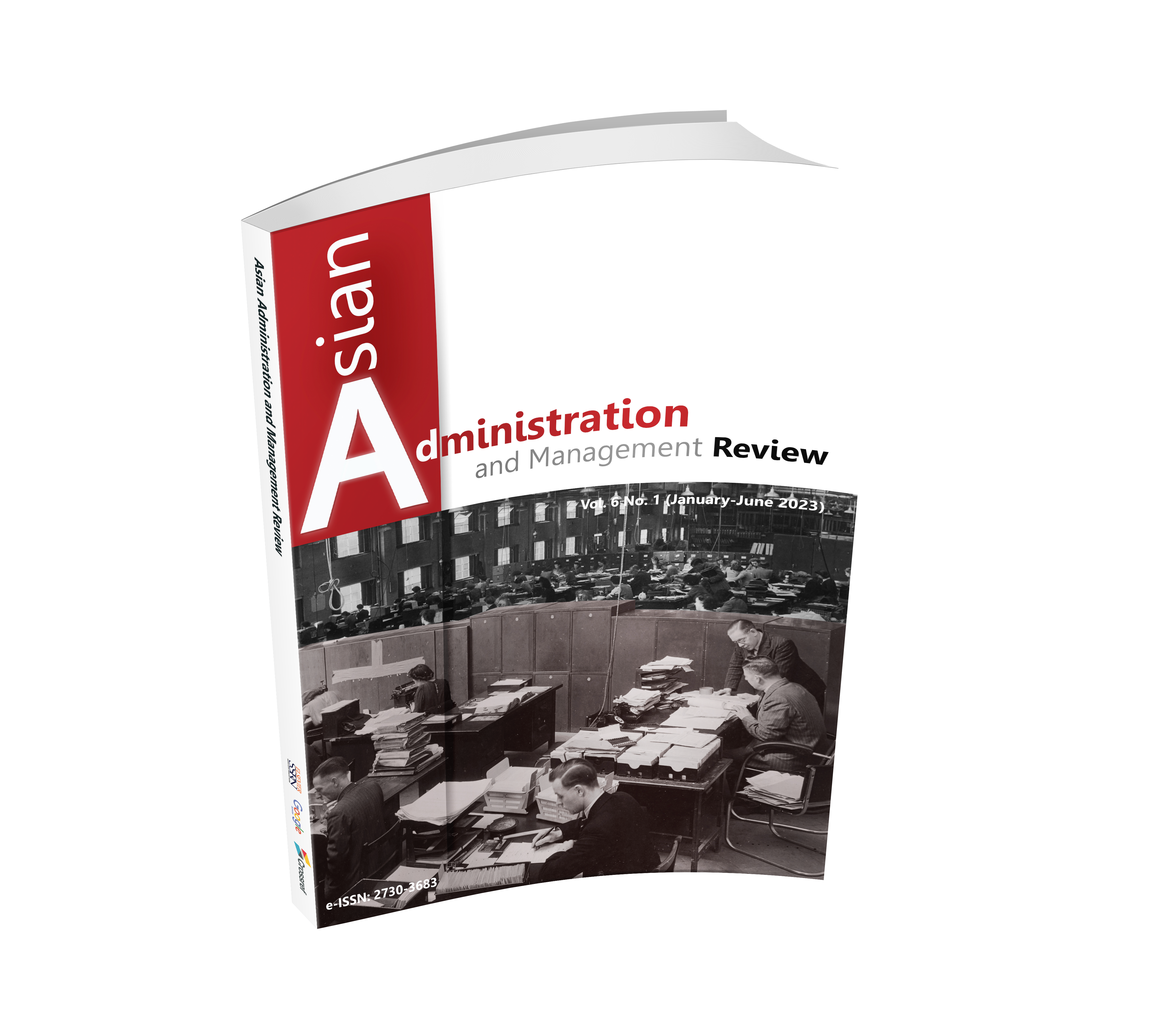CONSUMER PERCEPTION TOWARDS ONLINE HOSPITALITY BUSINESS MODELS IN THE NEW NORMAL
DOI:
https://doi.org/10.14456/aamr.2023.1Keywords:
Awareness, Service Business, Online Media, New Normal LivingAbstract
The objectives of this research were to 1) study the perception of service business through online media, 2) analyze the components of the perception of service business through online media, and 3) design the factors of the perception of service business through online media supporting the new normal living. The sample group was 400 tourists who were customers of the accommodation business service in 3 provinces of Thailand. The questionnaires were applied, and the statistics were frequency, percentage, mean, standard deviation, and exploratory factor analysis. The results revealed that most of the respondents were female, 61.50%, aged 25-31 years, 79.50%, had a single status, 64.00%, graduated with a bachelor’s degree, 83.80%, were company employees, 46.30%, and had a monthly income between 25,001-30,000 THB. for 57.30. For the perception of service business through online media supporting the new normal living, the mean of the perception was at a high level. The results of the survey component analysis yielded a KMO of 0.964, explaining the variance of the questions at 65.696%. The results in determining the perception form of the service business through online media revealed four new components; the 1st component was Line communication, the 2nd component was unique content creation through YouTube, the 3rd component was social group creation through Instagram, and the 4th component was awareness through Facebook which was used to create a competitive advantage in the marketing of service business perception.
Downloads
References
Benharoon, S., Mitya, A., & Jitprom, K. (2020). Marketing Communication of Nap Krabi Hotel. A paper presented at the RSU National Research Conference 2020, Rangsit University, Thailand.
Cheung, C., Chiu, P., & Lee, M. (2011). Online social networks: Why do students use Facebook? Computers in Human Behavior, 27(4), 1337-1343.
Chiu, C., Wang, E., Fang, Y., & Huang, H. (2014). Understanding customers' repeat purchase intentions in B2C e-commerce: The roles of utilitarian value, hedonic value, and perceived risk. Information Systems Journal, 24(1), 85-114.
Chuaikrut, C., Phusanam, A., & Dejmanee, O. (2020). Factors Affect to Tourist Behavior of Thai Teenagers after Invasion of Covid-19. Neu Academic and Research Journal, 10(3), 187-201.
Darmawijaya, I., Suda, I., & Utama, I. (2022). The Success of Traditional Village-Based Tourism Management Model Amid Covid-19 Pandemic in Kutuh Village, Badung Regency, Indonesia. Asian Administration and Management Review, 5(2), 37-46.
Division of Economics, Tourism and Sports. (2022). Tourism Situation in March 2022. Bangkok: Division of Economics, Tourism and Sports.
Ekakun, T. (2000). Research Methods in Behavioral and Social Sciences. Ubon Ratchathani: Ubon Ratchathani Rajabhat Institute.
Gulati, S., Verayangkura, M., & Sirirak, S. (2018). Causal of Digital Marketing Influencing Hotel Customers’ Satisfaction and Loyalty in the Andaman Triangle Cluster, Thailand. Journal of the Association of Researchers, 23(3), 217-228.
Khanthum, T. (2019). Marketing Communications Strategy through “Content Creator” Effecting Bangkok Consumers’ Decision on 4-Star Hotels. Master of Business Administration Thesis, Bangkok University.
Klapper, J. (1960). The Effects of Mass Communication. New York: The Free Press.
Malasin, S., Phattanagosai, T., & Sirichodnisakorn, C. (2022). Guidelines for Digital Platform Development to Create Competitive Advantage for Hotel Business in Thailand. Journal of MCU Peace Studies, 10(4), 1545-1559.
Ministry of Tourism and Sports. (2022). Summary of the staying situation, number of visitors and revenue from visitors. Bangkok: Ministry of Tourism and Sports.
Muneekaew, P., Pariwongkultorn, N., Namwong, S., Puripakdee, S., & Jittithavorn, C. (2022). Customer Experience Management and Thainess in Hotels: The Case of West Coast Tourism Development Zone. Journal of Business Administration and Social Sciences Ramkhamhaeng University, 5(3), 66-84.
Qun, L., Leelapattana, W., Trakansiriwanich, K., Waiapha, Y., &Sitthikun, S. (2022a). Management Adaptation Model of Small and Medium-Sized Hotel Business During the Covid-19 Pandemic: A Case Study in Muang District, Chiang Mai Province. Journal of Interdisciplinary Research: Graduate Studies, 11(2), 178-187.
Qun, L., Leelapattana, W., Trakansiriwanich, K., Waiapha, Y., & Sitthikun, S. (2022b). Market Mix Factors Affecting Thai Tourists' Decision to Use Small and Medium-Sized Hotels under the Critical Conditions of the Covid-19 Pandemic in Chiang Mai, Thailand. Asian Administration and Management Review, 5(2), 77-85.
Sakukritteenun, K., & Weerakit, N. (2018). The usage of social media for marketing of 4-5 star independent hotels in Changwat Phuket, Thailand. Veridian E-Journal, 11(3), 345-362.
Stock Exchange of Thailand. (2015). Structure of industry grouping and business sectors of the Stock Exchange of Thailand. Bangkok: Stock Exchange of Thailand.
Sujaritsathit, P. (2019). Factors influencing the consumer’s perception of advertising via online media, Instagram. Master of Arts Thesis, Bangkok University.
Warit, C., Wongchavalitkul, B., & Pairikreng, W. (2019). Key Factors in Customer Relationship Management on Social Media of The Hotel Industry in Thailand. Journal of International and Thai Tourism, 15(1), 103-130.
Waroonkun, S., & Waroonkun, T. (2021). Foreign Tourist Hotel Selection within Chiang Mai Old City. Payap University Journal, 31(2), 50-63.
Wiangkham, T., & Charoenwisan, K. (2022). Brand Experiential Marketing: Influencing Values of Boutique Hotels. Journal of Rattana Bundit University, 17(1), 72-84.

Downloads
Published
How to Cite
Issue
Section
License
Copyright (c) 2023 Authors

This work is licensed under a Creative Commons Attribution-NonCommercial-NoDerivatives 4.0 International License.











.png)


